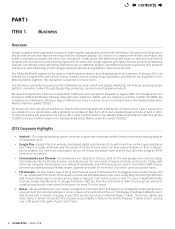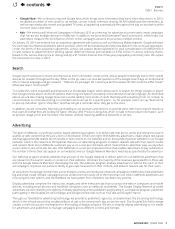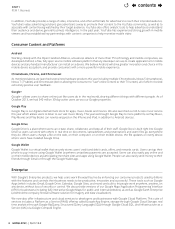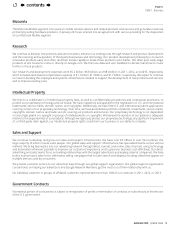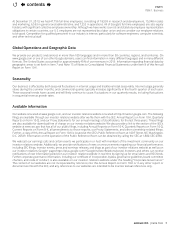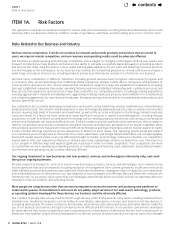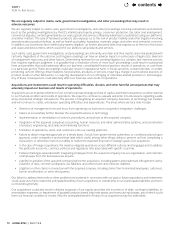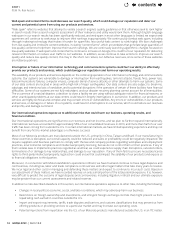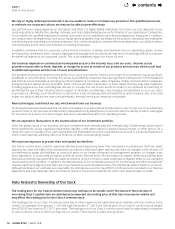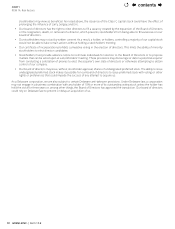Google 2013 Annual Report Download - page 18
Download and view the complete annual report
Please find page 18 of the 2013 Google annual report below. You can navigate through the pages in the report by either clicking on the pages listed below, or by using the keyword search tool below to find specific information within the annual report.12 GOOGLE INC.
PART I
ITEM1A.RiskFactors
Regardless of the merits of the claims, intellectual property claims are often time consuming, expensive to litigate or settle, and
causesignicantdiversionofmanagementattention.Totheextentsuchintellectualpropertyinfringementclaimsaresuccessful,
theymayhaveanadverseeectonourbusiness,consolidatednancialposition,resultsofoperations,orcashows.
Our intellectual property rights are valuable, and any inability to protect them could reduce the value of our products,
services, and brand.
Our patents, trademarks, trade secrets, copyrights, and other intellectual property rights are important assets for us. Various
events outside of our control pose a threat to our intellectual property rights, as well as to our products, services and technologies.
Forexample,eectiveintellectualpropertyprotectionmaynotbeavailableineverycountryinwhichourproductsandservices
aredistributedormadeavailablethroughtheinternet.Also,theeortswehavetakentoprotectourproprietaryrightsmaynot
besucientoreective.
Although we seek to obtain patent protection for our innovations, it is possible we may not be able to protect some of these
innovations. Moreover, because of our long-term interests in open source, we may not have adequate patent protection for certain
innovationsthatlaterturnouttobeimportant.Furthermore,thereisalwaysthepossibility,despiteoureorts,thatthescopeof
theprotectiongainedwillbeinsucientorthatanissuedpatentmaybedeemedinvalidorunenforceable.
We also seek to maintain certain intellectual property as trade secrets. The secrecy could be compromised by outside parties, or
by our employees, which could cause us to lose the competitive advantage resulting from these trade secrets.
We also face risks associated with our trademarks. For example, there is a risk that the word “Google” could become so commonly
used that it becomes synonymous with the word “search.” If this happens, we could lose protection for this trademark, which
could result in other people using the word “Google” to refer to their own products, thus diminishing our brand.
Anysignicantimpairmentofourintellectualpropertyrightscouldharmourbusinessandourabilitytocompete.Also,protecting
our intellectual property rights is costly and time consuming. Any increase in the unauthorized use of our intellectual property
could make it more expensive to do business and harm our operating results.
We may be subject to legal liability associated with providing online services or content.
We host and provide a wide variety of services and products that enable users to exchange information, advertise products and
services, conduct business, and engage in various online activities both domestically and internationally. The law relating to the
liability of providers of these online services and products for activities of their users is still somewhat unsettled both within the
U.S. and internationally. Claims have been threatened and have been brought against us for defamation, negligence, breaches of
contract, copyright or trademark infringement, unfair competition, unlawful activity, tort, including personal injury, fraud, or other
theories based on the nature and content of information that we publish or to which we provide links or that may be posted
online or generated by us or by third parties, including our users. In addition, we are and have been and may again in the future
be subject to domestic or international actions alleging that certain content we have generated or third-party content that we
have made available within our services violates U.S. and non-U.S. law.
We also arrange for the distribution of third-party advertisements to third-party publishers and advertising networks, and we
oerthird-partyproducts,services,orcontent.Wemaybesubjecttoclaimsconcerningtheseproducts,services,orcontentby
virtue of our involvement in marketing, branding, broadcasting, or providing access to them, even if we do not ourselves host,
operate,provide,orprovideaccesstotheseproducts,services,orcontent.Defenseofanysuchactionscouldbecostlyandinvolve
signicanttimeandattentionofourmanagementandotherresources,mayresultinmonetaryliabilitiesorpenalties,andmay
require us to change our business in an adverse manner.
Privacy concerns relating to our technology could damage our reputation and deter current and potential users from
using our products and services.
From time to time, concerns have been expressed about whether our products, services, or processes compromise the privacy of
users and others. Concerns about our practices with regard to the collection, use, disclosure, or security of personal information
orotherprivacyrelatedmatters,evenifunfounded,coulddamageourreputationandadverselyaectouroperatingresults.
In addition, as nearly all of our products and services are web-based, the amount of data we store for our users on our servers
(including personal information) has been increasing. Any systems failure or compromise of our security that results in the release
of our users’ data could seriously limit the adoption of our products and services, as well as harm our reputation and brand and,
therefore,ourbusiness.Weexpecttocontinuetoexpendsignicantresourcestoprotectagainstsecuritybreaches.Theriskthat
these types of events could seriously harm our business is likely to increase as we expand the number of web-based products
andservicesweoer,andoperateinmorecountries.
contents


